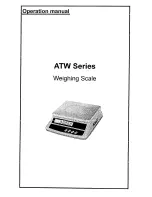
BewellConnect - BW-SCF5 - User Manual - 072016
BewellConnect - BW-SCF5 - User Manual - 072016
18
19
2. INFORMATIONS
2-1. UNDERSTANDING THE ENERGY BALANCE
All food provides calories and all calories provide energy. The human body uses this energy
to live, breathe and perform all daily activities. A man consumes more energy than a woman.
Generally, a man’s energy needs are 5 to 10% higher than those of a woman, with the exception
of pregnant or breastfeeding women, whose daily calorie requirements ensure the good health
of the mother and baby. This energy is measured in kilocalories (1 kilocalorie = 1000 calories).
It is recorded in Kcal but by misuse of language, we continue to use the term «calorie» instead
of «kilocalorie.».
The energy balance represents the difference between caloric intake and expenditure.
2-2. MY ENERGY INTAKE
Your energy intake comes from the foods you eat. They provide calories in the form of 3 types of
macronutrients: proteins, carbohydrates and lipids.
To control your energy intake, it is important to know how many calories a food provides.
MACRONUTRIENTS / KCAL CONVERSION TABLE
1 g protein
4 kcals
1 g carbohydrates
4 kcals
1 g fat
9 kcals
For example, a 154 g fillet of white fish provides 255.2 kcals.
37.7 g protein
37.7 g x 4 kcal/g
150.8 kcals
0 g carbohydrates
0 g x 4 kcal/g
0 kcals
11.6 g fat
11.6 g x 9 kcal/g
104.4 kcals
2-3. MY ENERGY EXPENDITURE
You have two types of energy expenditure: basal metabolism and exercise.
Basal meta exercise = energy expended per day
Basal metabolism is the minimum energy the body needs to maintain vital functions. It can vary
greatly from one individual to another. Indeed, it depends on age, sex, weight, etc. It generally
represents between 60 and 70% of total metabolism (total energy expenditure).
Exercise includes sports such as walking to work, climbing stairs or walking to take public transport.
2-4. CALORIE REQUIREMENTS
We do not all have the same calorie requirements. They depend on our age, our sex, our body
type, our exercise, and the time of day when calories were consumed.
That is why it is useless to start a diet or to set a quota of calories to consume per day without
really knowing your own specific calorie requirements.
You are a woman aged between 18 and 40 :
- You do not take any exercise: you need approximately 1,900 calories per day.
- You are active: you need approximately 2,150 calories per day.
- You are very athletic: you need approximately 2,500 calories.
You are a woman aged over 40 :
- You do not take any exercise: you need approximately 1,750 calories per day.
- You are active: you need approximately 2,000 calories per day.
- You are very athletic: you need approximately 2,350 calories per day.
You are a man aged between 18 and 40 :
- You do not take any exercise: you need approximately 2,350 calories per day.
- You are active: you need approximately 2,650 calories per day.
- You are very athletic: you need approximately 3,250 calories.
You are a man aged over 40 :
- You do not take any exercise: you need approximately 2200 calories per day.
- You are active: you need approximately 2,450 calories per day.
- You are very athletic: you need approximately 3,050 calories per day.
For pregnant women and breastfeeding women, you need more calories per day: allow ap-
proximately 340 calories for a pregnant woman from her second trimester of pregnancy, and
approximately 330 calories for a breastfeeding woman.
2-5. MANAGING MY ENERGY BALANCE
To manage my energy balance, I have to watch my energy intake and expenditure. You lose
weight when you absorb fewer calories than your requirements. (That is to say, less than your
total metabolism and your daily calorie expenditures.) You gain fat if you absorb more calories
than required. Therefore no food is really fattening or slimming, it is simply a matter of striking
a balance.
You can therefore act on two factors in order to tip the scales one way or the other:
- Act on expenditure through exercise
- Act on calorie intake
To stay healthy and lose weight, it is essential to take exercise for a healthy lifestyle. Taking exer-
cise acts in synergy with monitoring calorie intake and a balanced diet in the long term.
























